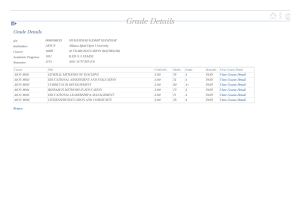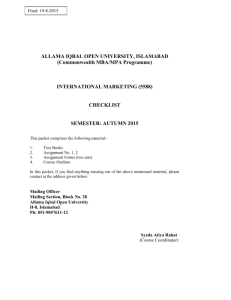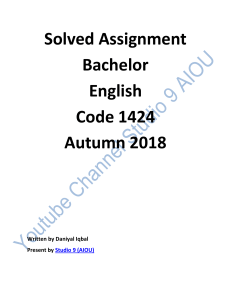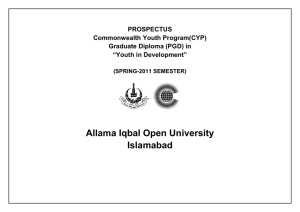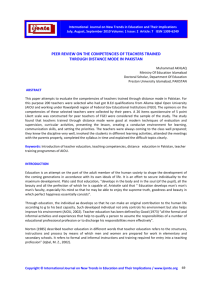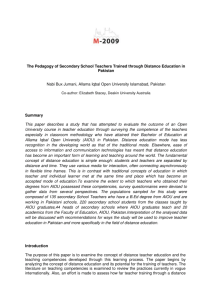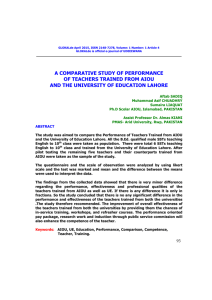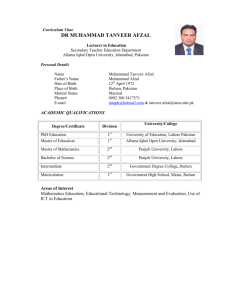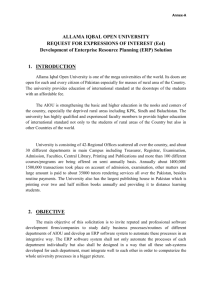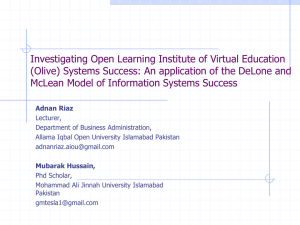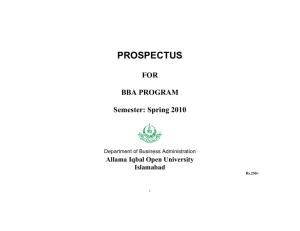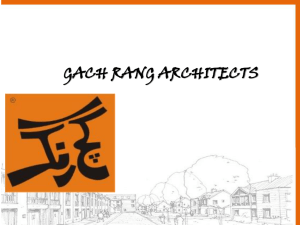zahid_majeed_session_9
advertisement
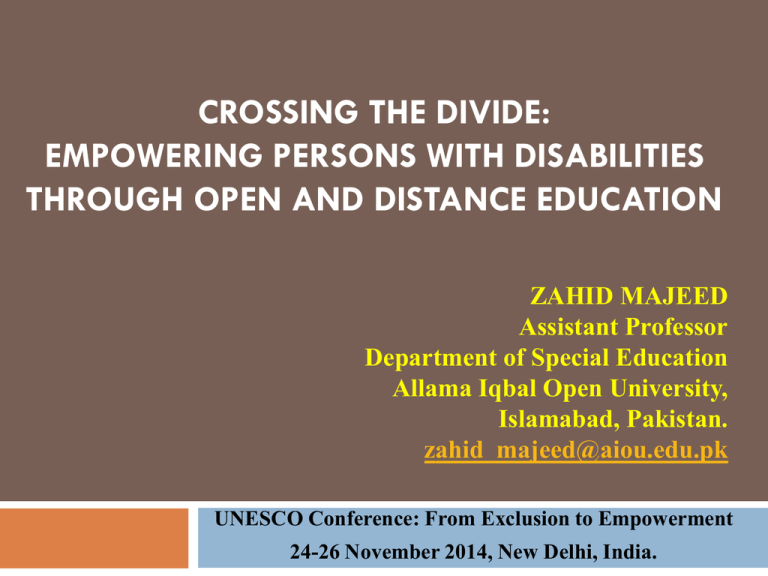
CROSSING THE DIVIDE: EMPOWERING PERSONS WITH DISABILITIES THROUGH OPEN AND DISTANCE EDUCATION ZAHID MAJEED Assistant Professor Department of Special Education Allama Iqbal Open University, Islamabad, Pakistan. zahid_majeed@aiou.edu.pk UNESCO Conference: From Exclusion to Empowerment 24-26 November 2014, New Delhi, India. Parallel Session 9 Track-III: Access to Information and Knowledge Open and Distance Learning Services for Learners with Disabilities: the Rights Perspective Inclusive Education People with Disabilities: Pakistan 2.49% of total population (1998 census) National Policy for Persons with Disabilities 2002 Physically Handicapped: 19% Hearing Impaired: 7.40% Mentally Challenged: 14% Visually Impaired: 8.60% Multiple: 8.21 Others (not classified): 43.33% Education Policy 2009: Inclusive Education Disabled Persons (Employment and Rehabilitation) Ordinance 1981 From Exclusion to Empowerment Educational provisions for 1% of 2.49 Free Education Free Transportation, Food, Uniform and Books Monthly Stipend Double Salary for Special Education Teacher Cochlear Implementation Teacher Training (Pre and In-service) Free Medical Facilities Students with Special Needs Few hundred educational institutions up to K-12 Conventional education system not able to cope the special needs of disabled students AIOU the only institution welcomes special need students from school education to graduate level. The results are encouraging because the ODL system is much flexible and accommodative for the students with special needs. The SNS mostly used ICT devices and software for learning and communication AIOU enrolled about 500 Students/year with Special Needs Physically Handicapped Hearing Impaired Blind/Visually Impaired Emotional, Psychological and Behavioural Disordered Multiple/Cross Disability Support system in-line with online education and Web 2.0 technologies for the teachinglearning process of PWD Allama Iqbal Open University ALLAMA IQBAL OPEN UNIVERSITY (AIOU) Allama Iqbal Open University (AIOU) is the first Open University in Asia. AIOU is a unique institution in Pakistan because of its philosophy, system, approach, functions and overall structure. The University with its main campus at Islamabad and huge network of regional centers spread all over the country is serving its clientele all over Pakistan and in the Middle East AIOU is a Distance Education institution, which provides multi disciplinary education from basic to doctoral level programs. ALLAMA IQBAL OPEN UNIVERSITY, ISLAMABAD,9 PAKISTAN Faculty at AIOU Four Faculties More than 40 departments About 150 Full Time Faculty About 80,000 Part Time Tutors About 1.3 Million Students About 100+ Staff with Special Needs Blind/Visually Impaired Physically Handicapped Hearing Impaired Emotionally, Psychologically and Behaviorally Disordered Facilities/Services for Special Need Students at AIOU Equal Educational Opportunities Free Education Relaxation in Admission Criteria/Eligibility Education for Parents, Spouse and Guardians of Special Need Students Free Books Free Soft-wares E-Content Online Classes for Multiple or crossed disability Students Sign language Content or Material in Braille Assistant for Writing in Examination for Blind Students Computer Typed Assignments or final Examination Assignments, Final Examination in Braille, on computer and voice recording AIOU’s Readiness Equal Educational Opportunities Free Education Special Need Students’ Friendly Admission Policies Ramps all over the campus Accessibility in each department of the university Online Content E-Library E-Examination Job Opportunities Workshops/Seminars/Trainings Experiences at AIOU and in Pakistan Following new Trends of ODL towards Inclusion Willingness, motivation and attitude of faculty Teacher-to-student ratio Customized instructional materials Special equipment and Training Inclusive Education Technological advances, especially in adaptive devices to attach to computers, Faculty Readiness Positive Attitude Acceptability Willingness and Motivation Knowledge about Special Need Students Individual Differences/Individuality Assessment (Basic/Screening) Formal and Informal Teaching Methods Administrative Admission Policy Fee/Scholarships Academic Admission Content/E-Content Methodology Evaluation Making lecture notes available or providing annotated reading lists, Online Learning Services Assessment Medical Transportation Faculty Development/Training Online Information Accessibility Equal Opportunities Use of Technology Study Support Resource centers Guidance & Counseling for Students and Parents Faculty Readiness…Training…Professional Development Assessment/Diagnosis of children with special needs Identification of special needs children Formal and informal Assessment Reading and interpretation of assessment reports Consultation/Collaboration with colleagues and professionals Consultation for support Participation in discussions Interaction with schools Recommendations of others Collaboration with Experts/colleagues Communication and Conversational Skills Communication with special needs children Conversation with parents Holding classroom Discussions Motivation/Social-emotional and Moral Development Methods for social development Making student feel at Ease Developing positive social atmosphere Guidance & Counseling Guidance to overcome the problems Counseling sessions Harmonious and safe working climate Creativity &Reflective Practice Corrective measures and Innovation Applications of theories Development of Individual Treatment Plan (ITP) Self reflection Self-employed learning Classroom Management & Organization Classroom management according to needs of children Information collection related children with special needs Maintaining up to date record for ITP Professional Development Developing own pedagogical views Efforts for self professional development Handling own emotions in difficult situations Future Planning The provision of special counseling for dyslexics Assessment and Evaluation Inclusive Education as Specialization COL MA Special Education Needs/Inclusive Education Curriculum Adaptations Workshops/Seminars/ Conferences Inclusive Education as Compulsory subject for all the programs THANKS FOR LISTENING ME QUESTIONS PLEASE
